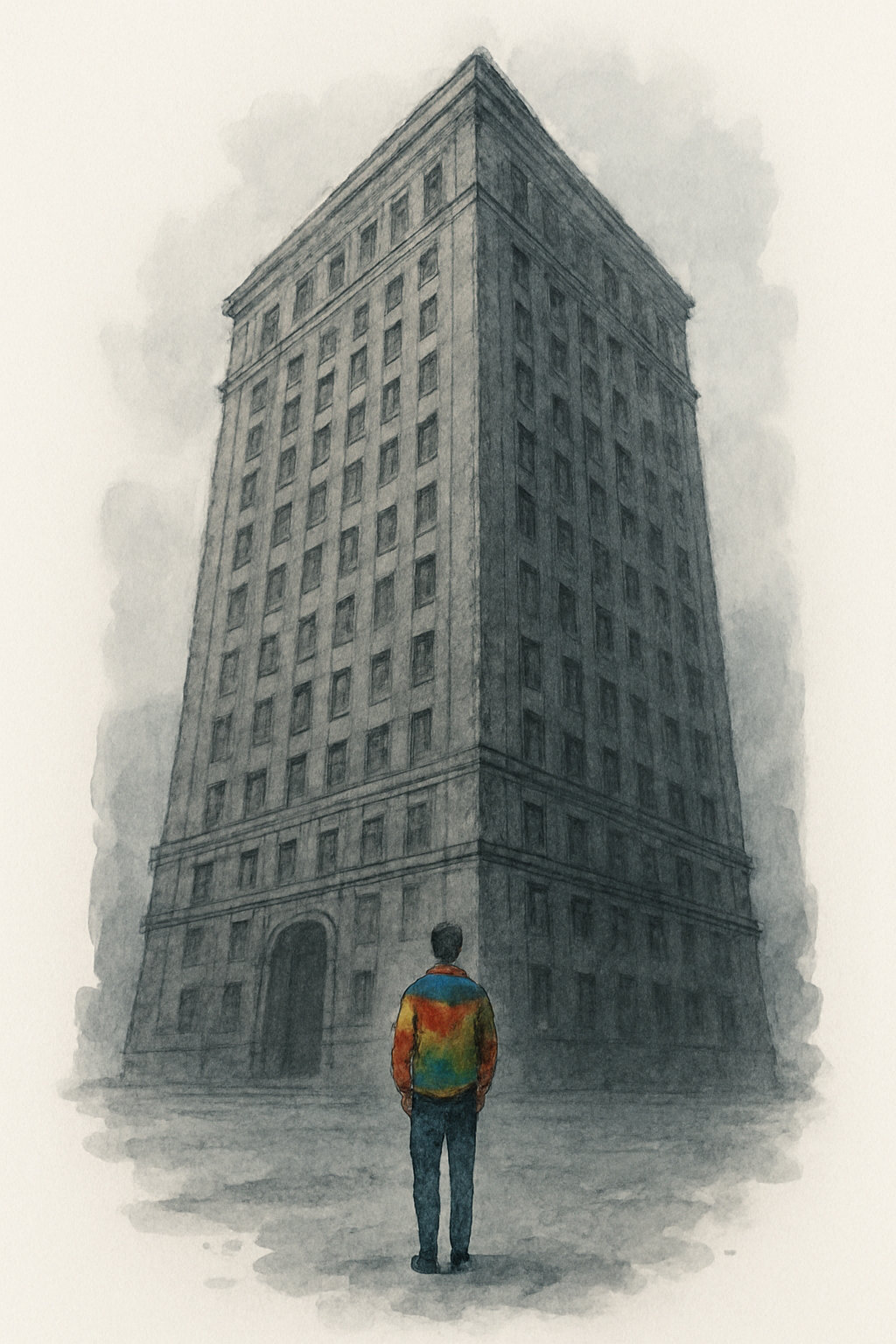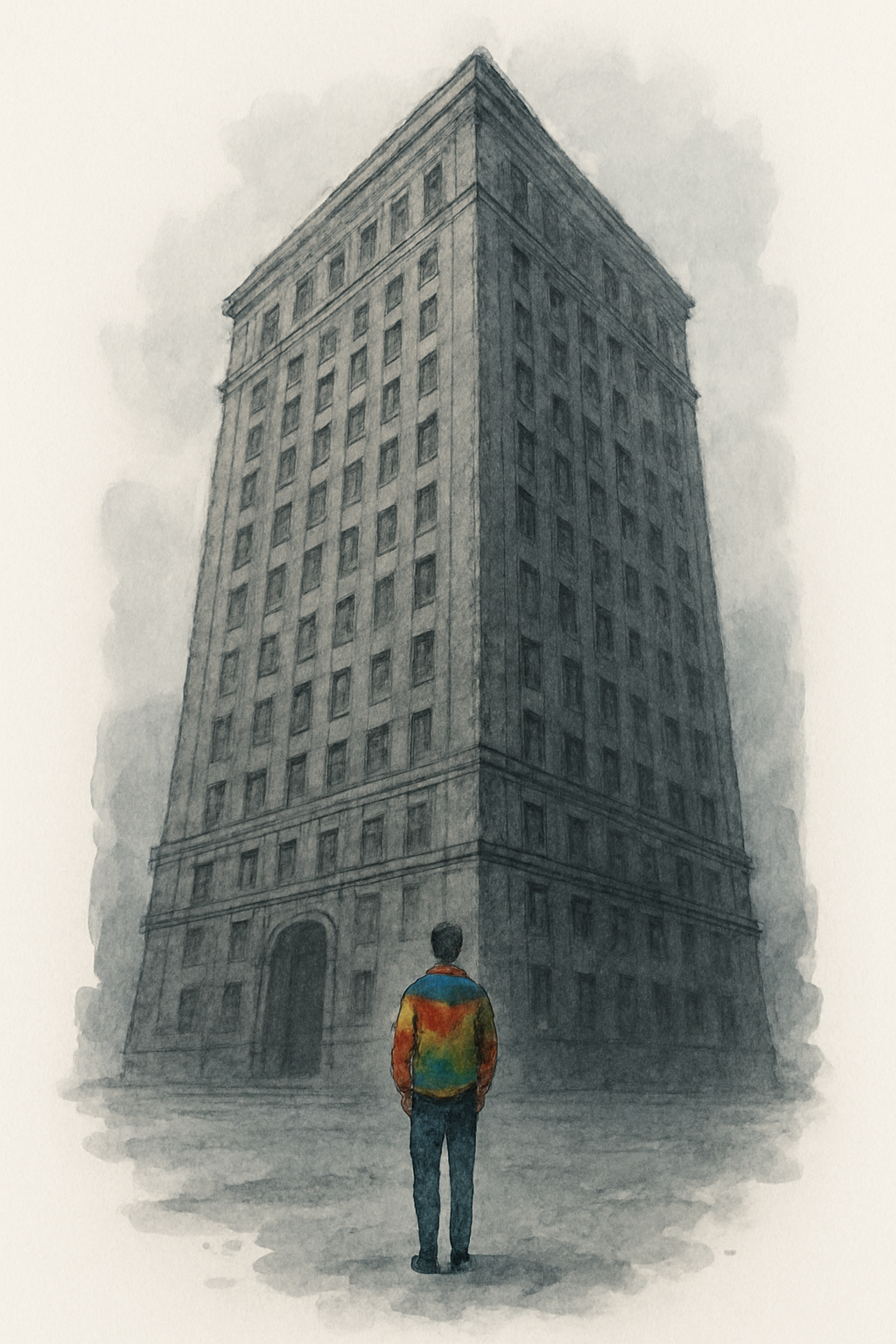Why Systems Hate Curious People

Curiosity is one of the most praised human qualities. (I am not biased… not biased at all on this :)
We talk about it in interviews. We post about it on LinkedIn. We celebrate it in children. It’s painted across the walls of modern offices and stitched into the mission statements of schools, companies, and governments.
But here’s the truth: most systems don’t actually want curious people.
They want compliant people. Cooperative people. People who perform curiosity just enough to appear engaged, without disrupting anything. They want people who stay within the lines, even as they’re encouraged to “think outside the box.” They want energy that supports the structure, not questions that pull at its edges.
Because real curiosity (not the polished, performative kind, but the raw, disruptive kind) is a threat.

The threat of real curiosity
Real curiosity doesn’t just ask interesting questions. It asks inconvenient ones. (It asks: Why do we always prioritize the opinions of senior leadership, even when frontline staff have more context?)
It pokes at foundations.
(It asks: Why are we still using a hiring process that filters out candidates without a college degree, even when the job doesn’t require one?)
It challenges hierarchy.
(It asks: Why does feedback only go one way during performance reviews?)
It slows down processes that are meant to run fast.
(It asks: Why are we rushing to launch this product when the beta users are still reporting serious issues?)
It makes space for ambiguity in systems designed for clarity.
(It asks: Why do we insist on using this single metric for success when it clearly doesn’t reflect the whole picture?)
It introduces tension where the culture prefers ease.
(It asks: Why are we avoiding the DEI report findings just because they’re uncomfortable?)
It shines light in places that have gone unquestioned for years.
(It asks: Why has the same team been underfunded year after year while others get automatic increases?)
Most systems depend on predictability and alignment to function. Real curiosity breaks that alignment. It introduces friction, unpredictability, and challenge. It asks not just “how can we improve this?” but “why is this the way it is in the first place?” And that question, asked in the wrong room at the wrong time, can feel dangerous.
So curiosity, despite being publicly praised, is often privately punished. Not through censorship or punishment, but through subtle signals that say: stay in line, move quickly, don’t dig too deep.
How systems protect themselves from curiosity
To understand why curiosity is so threatening, you need to understand what systems protect.
Systems are designed to preserve efficiency, certainty, hierarchy, and identity. These are not bad things, in themselves. But they become rigid. And over time, curiosity starts to look like a threat to every one of them.
- Efficiency — Curiosity slows things down. It creates side paths and detours. It asks you to pause the meeting, change the process, rethink the objective. And in fast-moving systems, detours feel dangerous.
- Certainty — Leaders are often expected to have answers. Curiosity introduces doubt. It forces people to say “I don’t know,” and that can feel like weakness in environments built around decisiveness.
- Hierarchy — Curiosity doesn’t respect titles. A well-placed question from a junior staffer can unravel a plan crafted by a leadership team. It levels the room. And not everyone wants a level room.
- Identity — Institutions, whether they’re companies, schools, or families, are built on stories. Curiosity asks, “What if that story isn’t true anymore?” And when identity is threatened, the system protects itself.
This is why real curiosity is often met with polite resistance. The system doesn’t say, “Stop asking.” It says, “Not now.” Or “Let’s be practical.” Or “We’ve already decided.”
And just like that, the door closes.
Performative curiosity vs. dangerous curiosity
There is a version of curiosity that systems love. It’s tidy, controlled, and outcome-driven. It asks safe questions:
- What are our competitors doing?
- How can we streamline this process?
- What if we changed the colors?
- Can we make public spaces more beautiful?
This is performative curiosity. It creates the illusion of innovation without challenging the underlying structure. It gives people the sense of progress, while reinforcing what already exists.
But dangerous curiosity asks better questions. Harder questions. Questions like:
- Why is this the way it is?
- Who decided this structure and who benefits from it?
- What if the goal is wrong?
- What aren’t we talking about?
- Why do we call some people “criminals” and others “leaders” for the same behaviors?
- Who gets to be safe? And at whose expense?
These questions don’t just tweak the output. They threaten the foundation. And that’s when systems push back: subtly, skillfully, and consistently.
The mechanics of quiet suppression
Very few systems will openly punish you for being curious. Instead, they’ll use softer tools to keep you quiet.
They’ll shame you. Labeling your questions as “unfocused,” “distracting,” or “too intense.”
They’ll delay you… saying, “Let’s not go there right now,” again and again until you stop trying.
They’ll isolate you. Making you feel like the only one who thinks this way.
They’ll exclude you. Keeping you out of meetings where your questions might disrupt the flow.
And they’ll exhaust you. Until you don’t have the energy to wonder out loud anymore.
This is the tax that curious people pay in systems that say one thing and reward another. Over time, most people learn. They stay curious in private, but silent in public.
Where this shows up
You can find this contradiction everywhere:
- In schools, where “critical thinking” is on the syllabus… but the moment a student questions why grades matter more than growth, or who decided what’s worth learning, they’re seen as unfocused or rebellious.
- In corporations, where “innovation” is a core value until someone asks why we’re still organized like a factory, or what we're optimizing for when no one has time to think.
- In governments, where “transparency” is promised but questions like who gets heard and when are met with spin.
- In families, where “openness” is a core value, until someone asks why certain things were never spoken aloud, or why one person always gets to define “normal.”
- In communities (in towns, neighborhoods, friend groups) where “togetherness” is the story, but asking why we keep doing things the same way, or why some people never feel quite at home, is seen as rocking the boat.
The system isn’t trying to be dishonest. It’s trying to stay intact. That’s its job. But it means the people who care the most (the ones willing to challenge, rethink, and imagine) often end up on the edge.
How to stay curious without burning out
You don’t have to abandon the system. But you do have to learn how to work inside it without letting it shrink your questions.
- Know the edges — Every system has a tolerance threshold. Learn where the edges are. Not to avoid them, but to understand how far you can go before resistance kicks in.
- Ask sideways — Sometimes the most powerful questions are indirect. Don’t ask “Why is this broken?” Ask, “What would this look like if we started from scratch?”
- Find your allies — You’re not the only one asking. Systems make curious people feel alone. Find the others. Build quiet coalitions. Share thinking before it gets shut down.
- Create your own room — Some questions can’t be asked in a boardroom or a classroom. That’s okay. Host dinners. Start a side project. Build the thing that doesn’t yet fit.
- Be clear about your purpose — Not every question needs to be asked out loud. Not every battle is worth fighting. Protect your energy. Curiosity is a long game. You need stamina.
- Use your access wisely — If you’re in a position of relative safety or influence, use it. Ask the harder questions. And make room for others to ask theirs, too.
Knowing when not to poke
Real curiosity is powerful, but it’s not always about disruption. Sometimes, the most responsible thing is to focus. To converge, not diverge. To move forward, not dig deeper.
Mature curiosity knows how to read the room.
It knows when to wait, when to whisper instead of shout, when to hold the question until the soil is ready. It’s not about silence. It’s about strategy.
So yes, ask the hard questions. Shine the light. Poke at the edges.
But also learn to ask yourself:
- Is this the right moment?
- Is this the right place?
- What happens if I ask this now?
- What happens if I wait and ask it better later?
The courage to keep asking
Staying curious inside a system that doesn’t reward it is hard. It takes clarity. It takes restraint. It takes a deep sense of purpose and a willingness to be misunderstood.
But it matters.
Because the people who ask the real questions (the uncomfortable, inconvenient, necessary questions) are the ones who move us forward.
They don’t just tweak systems.
They transform them.
So if you find yourself asking,
- “Why are we still doing this?”
- “What are we avoiding?”
- “What if this isn’t the only way?”
Keep going.
Don’t wait for permission.
And don’t expect applause. Because the people who benefit most from the way things are will never ask for change.
But that doesn’t mean it isn’t time.





